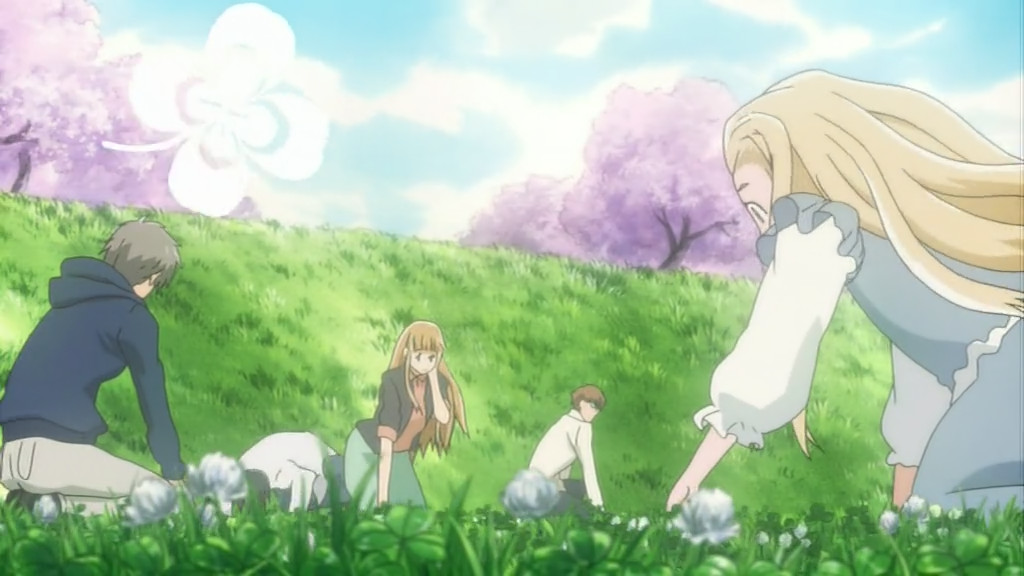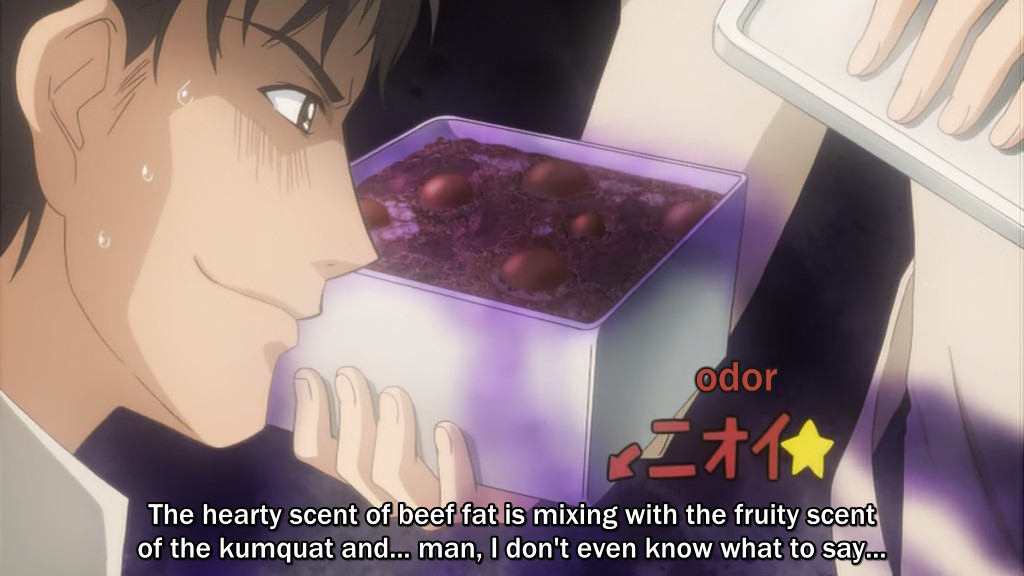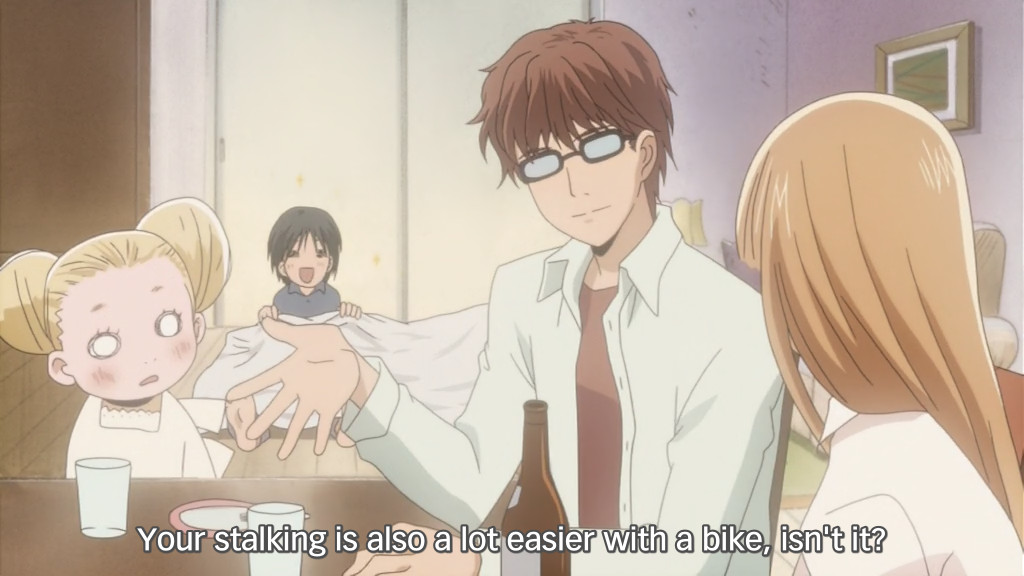My Fave is Problematic: Honey and Clover
by Rakka • Tags: anime honey-and-clover
Inspired by Anime Feminist’s series of the same name.
Honey and Clover is, full stop, my favorite anime. But it also has flaws in the plot which always makes me feel guilty to recommend it.

Content Warning: sexual assault. Spoiler Warning for Honey and Clover.
Chica UMINO’s story follows a group of students at an art college through to graduation, covering all their joys and troubles in between. From worrying about tuition to taking a year off from school, not having anything to eat to eating your friends’ terrible cooking (kumquat curry??), from struggling to pass your class to wondering what you’ll do after school; this show covers it all.

While billed as a romance, it’s not melodramatic and doesn’t feel improbable. If anything, it feels too real at the end when you realize that none of the couples make it. College ends, and they all go their separate ways—while remembering the time they had together. Even when Morita offers Hagimura the chance to just live with him—now that he’s a successful Hollywood animator, and she isn’t sure she can even be an artist after injuring her hand—she rejects it, choosing to work through her injury and hope for the best. But that empowering scene also leads into my first qualm with the series.
Problematic Couple: Hagimura and Shuuji
Maybe it’s confirmation bias, but anime/manga really seem to love the tropes of teacher/student pairings and “oh, we’re not that/really related.” Unfortunately, Hagimura Hanamoto and Shuuji Hanamoto end up together. Don’t worry—they’re not direct family! He’s her father’s cousin.
Ugh.
At the end1, Shinobu yells up to Hanamoto through a window, asking if he loves Hagimura. And he yells back that he loves her very much. Now, maybe it’s unclear what Professor Hanamoto means by “loving” Hagimura. After all, they’re relatives, he’s a professor, and he’s taking care of her now that she has to recover from her injury. The reaction of the other characters around them makes it clear though: they all congratulate him. Not exactly the kind of reception you’d get from just telling a family member that you love them, right? And of course, Shinobu had been vying for Hagimura’s affection—him asking is tantamount to “will you love her in my stead?”
This scene could easily have been played out any number of ways that didn’t leave you feeling uncomfortable. It could have been merely patronizing, or maybe even heartwarming, if it had been about taking care of or supporting her. Or instead of leaving a box of cash—no, seriously—with Shuuji, he could have, I dunno, given her the money instead, or worked out his feelings directly with her.
In the end, however, the show doesn’t double down on this problematic relationship. Hanamoto is shown just supporting Hagimura as she practices and regains use of her hand, more like a father or a brother than a lover. So a charitable interpretation of this scene would just be as comic relief, Shuuji just a relative who got a little carried away with words.
Problematic Couple: Mayama and Rika
The problems of the next couple are not so easily dismissed, unfortunately.

Mayama has had a one-sided crush for years on Rika, a widow several years his senior. Among other things,
- He stalks her, sitting outside her apartment and staring at her window 2. The show builds this up as an emotional scene, an insert song (Spitz’s “Yoru o Kakeru / 夜を駆ける”) in the background as he wistfully stares up at the square of light against the night sky. This could have been just as impactful a scene if, I dunno, he just got drunk and stumbled around outside and stared at the moon. Heck, then you could have thrown in the other trope of romance anime and punned on 月 and すき again.
- He joins her company and basically follows her around like a puppy dog.
- He freaks out when she books them separate hotel rooms for a business trip. 3
- He gets jealous of other guys around her—like her BUSINESS PARTNER—and actively tries to prevent them from being around each other 4.
- He watches over her as she sleeps once. When she calls out, half-awake, to her dead husband, thinking he’s there, he takes advantage of the situation and kisses her 5:
He remembers the night two years ago when he found her collapsed in the shower: as he had watched over her bed while she slept, she had taken his arm and called out to her husband, only to wake up and find Mayama there. Mayama took advantage of the situation and kissed her. —from Wikia
Taking advantage of someone’s confusion and emotional agony to steal a kiss is assault.
Worse, the show portrays how Rika is still dealing with the fallout from her injuries, and thus can’t perform some otherwise normal physical tasks by herself, which makes having a young dude with the hots for you follow you around all the time, trying to help you with things, even less desirable than normal. All throughout the show, it’s implied Mayama is a “nice guy” (Yamada even cries over him being “too kind to her”) who just can’t let go of Rika. But really, he’s just a controlling stalker; the only thing he sees in her is her beauty—he hardly even knows her circumstances, despite being around her all the time. When Yamada, his underclassman with a long-held crush on him, has a business dinner with Nomiya, a designer interested in commissioning work from her, Mayama even gets angry at her, as if it were any of his business at all. The show is even minimally self-aware of him being a stalker, with characters joking about his tendencies.
Honey and Clover’s greatest failure is that it never calls him out on his creepy, unsettling behavior, no matter how uncomfortable the situation gets. Sure, some of the characters joke about him being a stalker or ask him why he pursues Rika. But never does the show make it clear that what he’s doing is wrong, only perhaps futile. For a show that’s willing to tackle topics like accepting a new father or having to take a leave of absence from school, it stays far away from calling out harmful relationships.
In the end, I still think Honey and Clover’s positives outweigh these negatives. Partly that’s because of low expectations for anime in general; partly that’s because this show tells stories about college life and struggles that are rare to find. Neither are justifications or excuses for these flaws, but neither should turn you away from the show completely.